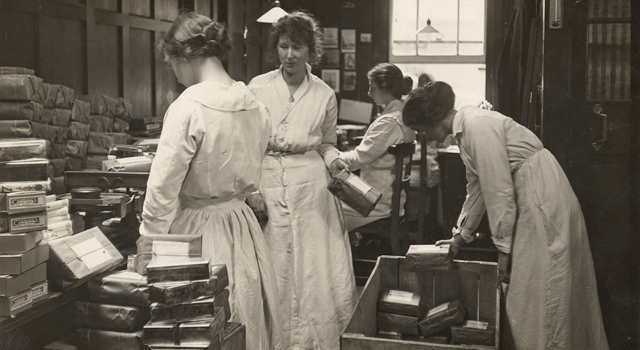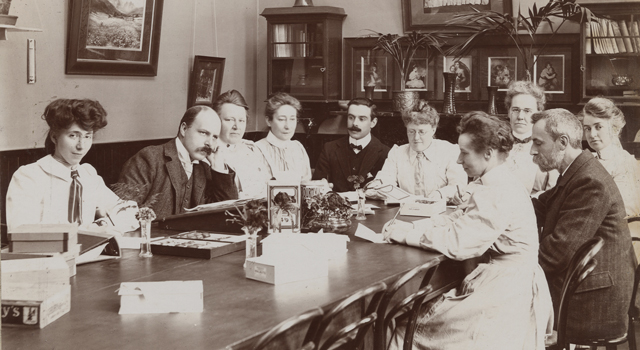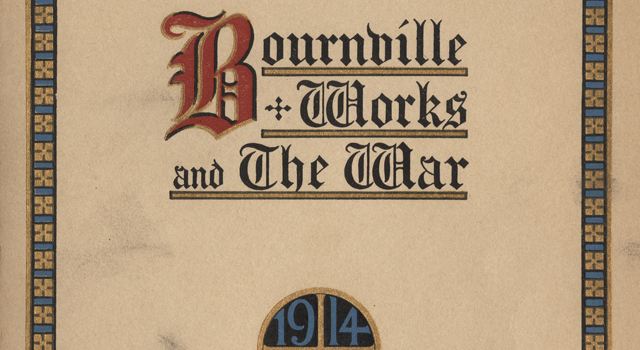Articles
2 Comments
By Voices
On 07, Mar 2014 | 2 Comments | In Gender | By Voices
Cadbury Angels and World War One
Jo-Ann Curtis, Birmingham Museums Trust
www.suburbanbirmingham.org.uk
As soon as war broke out and troops were deployed overseas, Cadbury Bros began producing ‘chocolate for the troops’. These gifts continued to be distributed throughout the duration of the war and in total 20,000 parcels were sent out to troops on the front, as well as to those who were wounded and recovering at home or in hospital.
![Packing Comforts for the Troops [Library of Birmingham: MS466/41/3a/89]](http://www.voicesofwarandpeace.org/wp-content/uploads/2014/03/ms-466-41-3a-89.jpg) The photograph ‘Packing Comforts for the Troops’ depicts Cadbury employees preparing to ship boxes of Cadbury’s Mexican Chocolate and books to British troops. Each box was packaged up with the message, ‘a present to our friends at the front, from the workpeople at Cadbury’s Bournville’.
The photograph ‘Packing Comforts for the Troops’ depicts Cadbury employees preparing to ship boxes of Cadbury’s Mexican Chocolate and books to British troops. Each box was packaged up with the message, ‘a present to our friends at the front, from the workpeople at Cadbury’s Bournville’.
Women employees at Cadbury during the First World War are predominantly represented as carers and nurturers. Recurring articles pertaining to the activities of the 3,500 female workforce included ‘Bournville Girls as Nurses’, and the knitting and sewing activities of individual departments. However, very little information is given regarding the experiences of women in the workplace during the war.
Both the Bournville Works Magazine and Bournville Works and the War 1914-1919, provide the reader with a vision of a workforce in harmony. But, for many women who were employed purely to supplement the depleted male workforce, the end of the war signified the termination of their employment. In the 1918 minutes of the Bournville Works Women’s Council, the company was considering the demobilisation of its supplementary female workforce.
![Girls' Works Committee, 1911 [Library of Birmingham: MS466/41/3/99]](http://www.voicesofwarandpeace.org/wp-content/uploads/2014/03/ms-466-41-3-99.jpg) During this time, Cadbury had disbanded their bar on the employment of married women. In 1919 a rare protest is recorded in the Bournville Works Women’s Council minutes by women who had been temporarily employed in one of the men’s departments, on the announcement of their demobilisation the following was recorded:
During this time, Cadbury had disbanded their bar on the employment of married women. In 1919 a rare protest is recorded in the Bournville Works Women’s Council minutes by women who had been temporarily employed in one of the men’s departments, on the announcement of their demobilisation the following was recorded:
‘Communication from Printing Shop Committee […] They think it fair that they should be given a chance to secure a position which will satisfy them, as they have stood by the firm during a time of difficulty. They would like to know exactly how they stand in the matter’.
This minute represented the experiences of many women at the end of the First World War. Although women were celebrated for stepping up to take on the roles of men during the war, once the male workforce returned women were expected to give up their newly found independence and status.
![Bournville Works and the War 1914-1919 [Library of Birmingham: LP66.53CAD]](http://www.voicesofwarandpeace.org/wp-content/uploads/2014/03/lp-66-53-cad_1.jpg) Bournville Works and the War 1914-1919 was a commemorative publication produced at the request of Cadbury’s employees in 1920. Throughout the war Bournville Works Magazine featured a column entitled ‘The Factory and The War’, recording the activities of Cadbury’s employees. The commemorative publication was a summary of this column.
Bournville Works and the War 1914-1919 was a commemorative publication produced at the request of Cadbury’s employees in 1920. Throughout the war Bournville Works Magazine featured a column entitled ‘The Factory and The War’, recording the activities of Cadbury’s employees. The commemorative publication was a summary of this column.
In November 1914, the first ‘Factory and the War’ column was published. Contained within is an address given by Cadbury Bros to its employees:
‘We feel that it is the duty of every one of us to be willing to sacrifice our own immediate interests on behalf of out country. Some have felt it their duty to go to the front, but it is not less incumbent upon those who, for conscientious or other reasons, cannot let their patriotism take this form, to bear their share’.
The Works Magazine’s record of the war carried the sentiment of this address, in that it recorded the individual and collective efforts of the company’s employees at home and on the Western Front. The magazine’s readership during the period included employees serving in the forces. This was reflected in the publishing of letters recounting experiences on the Western Front, as well as comments on articles within the magazine.
Throughout the duration of World War One, Cadbury continued with chocolate production, albeit at a reduced rate, affecting many factory floor employees working on piece-rates. As a result Cadbury established emergency financial provision for those whose earnings fell below a certain rate. The firm also provided financial assistance to dependants of employees who had enlisted and for widows or dependants of men killed in action.In total, 2,148 of Cadbury’s employees served during the war, many enlisting with local Birmingham Pals regiments.
This is an extract from www.suburbanbirmingham.org.uk
-
My mother worked at Cadbury’s during WW2, apart from working on the factory floor, she was an auxiliary nurse who along with her chums helped to rehabilitate shell shocked soldiers who were taken to Cadbury’s canteen once a week where the girls would work with them doing art/craft work and also singing and dancing with them. The girls also worked on the packing line sending vitaminised chocolates to the troops as emergency rations. My mother decided it would be great fun to put letters in the tins before they were sealed (Cadbury management / Dame Elizabeth were totally unaware of this) and in time the girls got replies back from the men along with face powder, lipstick and stockings. Mom kept the soldier’s replies and I found them amongst her personal effects when she died two years ago. I perform in community theatre in Milton Keynes and have written two stage plays based on Margaret’s (aka Mom) diaries, see the facebook link above . My parents set up the Austin Motor Company self build scheme just after the War and I also discovered all the minute books that go back to the first meeting c1951 . I also have the recruitment posters painted by my grandfather, that were put up around the Austin calling for men to sign up for building their own home. My father went to the Board of the Austin and put forward his proposals for the scheme. It took several attempts before he was taken seriously. The men needed Cadbury’s to sell them the land, which they did eventually, the Austin putting up the finances on a long term loan and between them, the men worked full time shifts at the Austin and then did their stint on the building site to build their own homes (approx 34 in total) in Bramble Close, Verbena Rd and Meadow Brook in Northfield). I am very proud of the legacy my parents left behind in these streets, mostly forgotten now as most of the men have passed on, my dad included,and new people have come in who don’t know the story behind their homes. Alison Smith
-
Hi Alison I have just read you message. My little boy is currently studying about chocolate and is really interested in ww2. He wanted to know what role the factory played. If you have any more information or stories you could share I would be greatful. Thank you
-






Comments